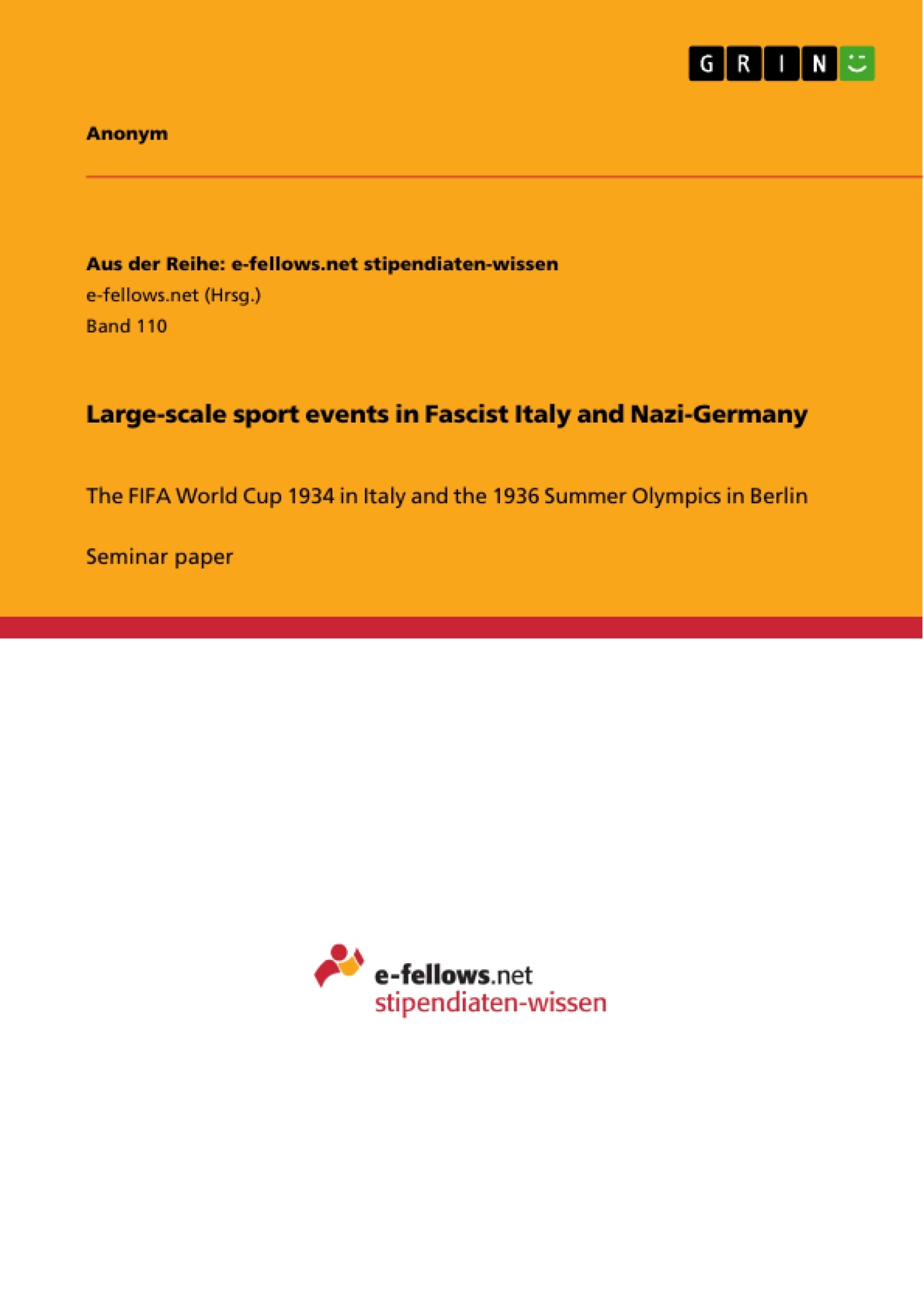Excerpt
Introduction
Since the 1930s, international sport has become a form of cross-cultural activity which is able to attract and influence broad masses. It serves as a symbol of identification, be it either with a single athlete or the entire nation. It is, in contrast to economic or diplomatic relations, not object to direct governmental involvement; yet, exactly this uncommon opportunity of non-obvious political influence and interference has been appealing to regimes throughout the time. Big international sports events as a tool for political propaganda were discovered by Mussolini and Hitler, pertaining to 'their' respective event. The all forms of sport embracing Olympic Games, despite good-sounding mythological elements, turned out to mainly thrive on ties to global affairs, especially in non-democratic states. In this respect, Hitler’s Nazi-Germany took the vanguard role in 1936 by realizing how behind mere sports competition domestic and international goals could be pursued. Two years earlier, the fast-growing single sports competition, namely the Football World Cup, had already been captured by the Fascist regime in Italy which saw the chance for an intrusion of political content as well.
In the context of this History course which focuses on those two political movements, this paper tackles the question to which degree the named large-scale sports events were actually abused in the respective countries for propaganda purposes. Hereby, motives, goals, and strategies of the two regimes will be examined to obtain a comprehensive analysis. Finally, a concluding short comparison aims at clarifying which government accomplished its goals more 'successfully'.
Of course the realm and the content of the two events don’t allow an entirely congruent comparison. However, as Martin (2004) argues correctly, both Hitler and Mussolini believed that the road to power lay “through […] the manipulation of mass passions” (p. 102). Indeed, as we will see, the similarities are striking, and the World Cup in Mussolini’s Italy, for instance, is not for nothing referred to as “his Berlin Olympics” (ibid., p. 173). The first part of this paper will now elaborate more on this 'national game' of the Duce when it was hosted by the Fascist regime in 1934.
The fascinization of the Football World Cup 1934
After the great success of football as a discipline under the aegis of the Olympic Games 1924 and 1928 in London and Amsterdam, which were both restricted to amateurs though, the call for a “worldwide showcase for its best professional players” (Longman, 1994) led to the establishment of the Football World Cup. It first took place in Uruguay in 1930 and despite its limited size was a great start off for this single sport on the international stage (Schulze-Marmeling, 2006, p.6). Already in 1930 Il Duce Mussolini then planned to host the football players of the world for the next tournament four years later, having of course specific goals in his mind (Martin, 2004, p. 173).
Conveniently, Mussolini himself was a great football fan and hence merged this personal enthusiasm with the political interest of the government because of the significant profit Fascism would draw out of this sport event (“History features”, 2008). Wynn (2007) describes how from very soon after having come to power, the Fascist regime used football as a means for not only improving the health of the population in order to make Italian men stronger, but also to enhance the development of the Nuovo Italiano (p. 12). According to the regime, this resurgence of the nation was necessary, for Italy after the unification was mainly defined by its geographical features rather than by being a national entity, given the stark difference of a modernizing north and a backward south. Football was considered as a helpful tool in the Mussolini regime to overcome this fragmented society (Martin, 2004, p. 1). Indeed, in the 1920s football “went mad” (Riordan & Krüger, 2003, 143) in Italy, with a national league being established in 1929, all in all a good basis for the upcoming big international event. With the world as a guest and the fervent tifosi in the rear at home, Italian Fascism saw the chance to show off and sell the merits of Fascist methods and rule to the domestic and foreign community. Pertaining to the indigenous people, calcio was (ab)used for spreading mythic rituals alluding to Roman concepts of physical commitment, but also for political allegiance and foster cultural mass consent. Moreover, it fit nicely in the ideology as football is a team sport and the mass in Fascist thinking weighed always more than the individual (Martin, 2004, p. 24).
[...]
- Quote paper
- Anonymous, 2008, Large-scale sport events in Fascist Italy and Nazi-Germany , Munich, GRIN Verlag, https://www.grin.com/document/175315
Publish now - it's free






















Comments